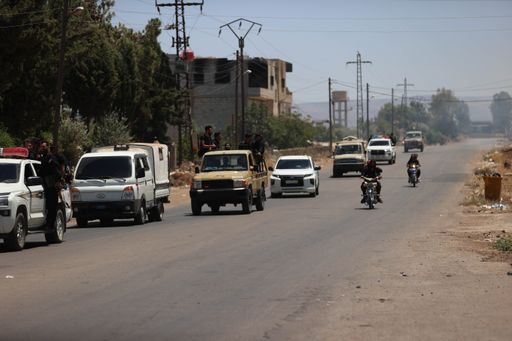Syria’s Health Ministry has dispatched an urgent medical convoy to Sweida as relative calm returned to the southern province under a recently brokered ceasefire.
According to the report by the state news agency SANA on Sunday, the convoy includes 20 ambulances, specialised medical teams, and large quantities of medicine and emergency supplies.
The aid convoy was organised in coordination with the ministries of emergency management, social affairs, and relevant UN organisations, the agency reported.
Israeli strikes delayed the aid
Health Minister Musab Al-Ali said that the aid convoy had been ready for days but was delayed due to Israeli air strikes.
He confirmed that the convoy was able to move after Syrian security forces cleared out tribal fighters and implemented a ceasefire announced by the presidency on Saturday.
Interior Minister Anas Khattab confirmed that the situation began to calm in Sweida after the deployment of Internal Security Forces (ISF) in the northern and western regions.
Security forces “were able to enforce a ceasefire within Sweida city, paving the way for a prisoner exchange and the gradual return of stability throughout the province,” he said on X.
“The deployment of the ISF in Sweida represents a safety valve for stability and calm, and a first step in controlling the chaos of weapons and consolidating security,” he said.
“Our compass is a complete ceasefire, allowing the state to fully assume its role in restoring normalcy to Sweida city and the rest of the province.”
Aid for all
Speaking to Anadolu, Minister of Emergency and Disaster Management Raed al-Saleh said that the government is delivering services to all residents of Sweida, regardless of their affiliations or background.
“Emergency and disaster response teams remain stationed at a humanitarian crossing to help evacuate families,” he said.
“We just evacuated two families who reached the crossing from Sweida on foot, and we are working to assist more.”

Ceasefire
Earlier, tension flared in the area when Hikmat al-Hijri, one of the top Druze religious leaders in Sweida, refused to allow an official government delegation accompanying the aid convoy to enter the province.
Only the Syrian Arab Red Crescent was permitted to deliver the aid, while the government delegation returned to Damascus.
The Syrian Foreign Ministry, for its part, strongly condemned the obstruction of the humanitarian convoy bound for Sweida.
A ministry statement said that multiple attempts to deliver aid to civilians in Sweida were thwarted by armed militias linked to Hijri since Wednesday.
The ministry said Israel’s “blatant aggression” and the withdrawal of Syrian security forces from Sweida led to a breakdown of order and hindered the delivery of aid to civilians.
It vowed to “continue its efforts in coordination with both domestic and international partners to deliver aid to the province and ensure the safe return of displaced residents.”
Withdrawal of tribal fighters
Saturday’s ceasefire declaration came hours after the Interior Ministry announced the full withdrawal of tribal fighters from Sweida and a cessation of hostilities across the city.
Interior Ministry spokesperson Noureddin al-Baba said security forces had successfully implemented the ceasefire and cleared the northern and western regions of the province, bringing an end to urban clashes.
In a televised statement, Information Minister Hamza al-Mustafa outlined the ceasefire’s three phases: restoring security through internal security forces in rural areas and main roads, opening humanitarian crossings between Sweida and Daraa, and gradually reactivating state institutions and law enforcement.
On July 13, clashes broke out between Bedouin Arab tribes and armed Druze groups in Sweida.
Violence escalated, and Israeli air strikes followed, including on Syrian military positions and infrastructure in Damascus.
Israel cited the “protection of Druze communities” as a pretext for its attacks.
Most Druze leaders in Syria, however, have publicly rejected any foreign interference and reaffirmed their commitment to a unified Syrian state.




















